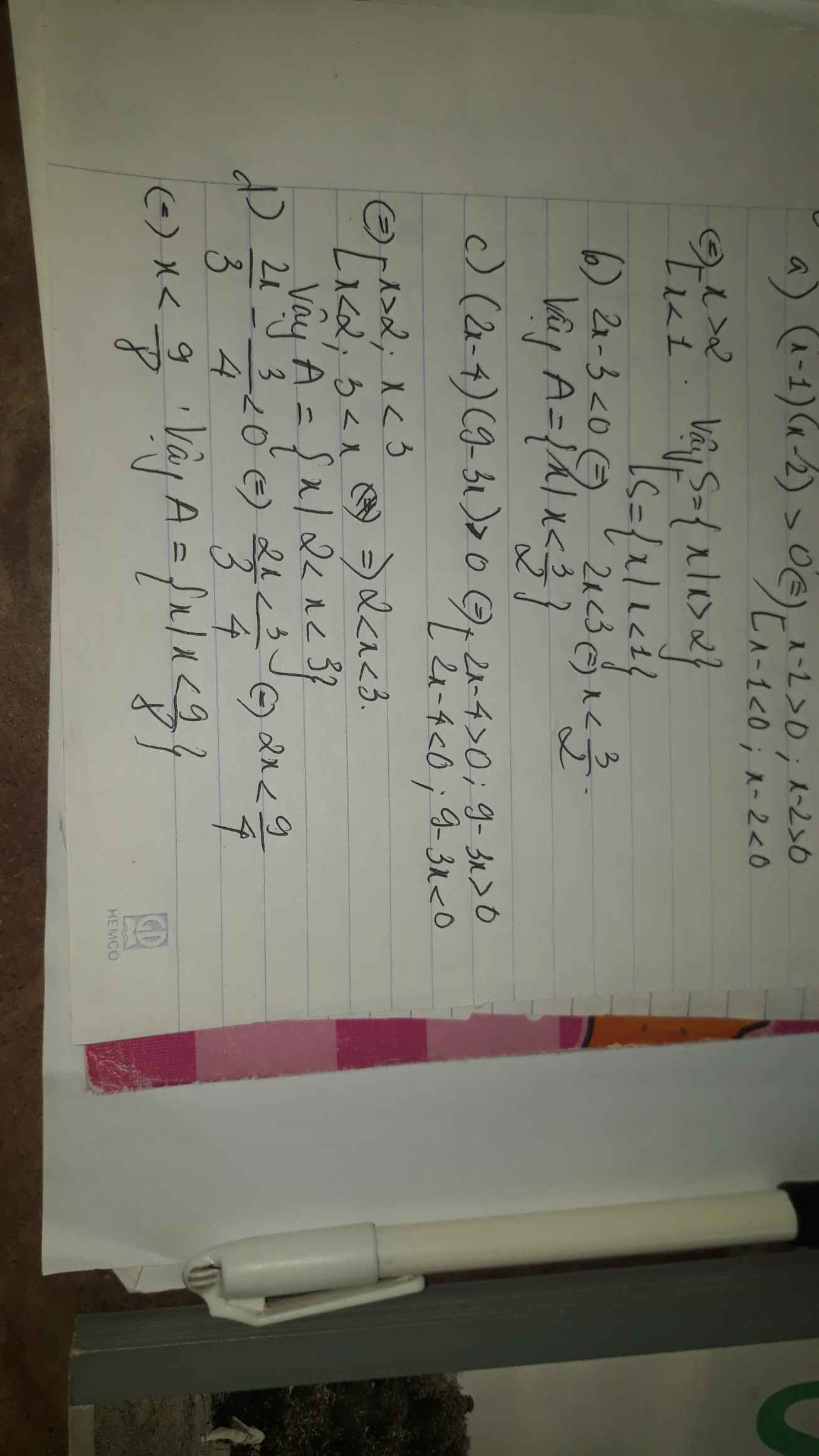
Hãy nhập câu hỏi của bạn vào đây, nếu là tài khoản VIP, bạn sẽ được ưu tiên trả lời.


Bài 1 :
\(C=\frac{1}{\left|x-2\right|+3}\)
\(C\le\frac{1}{3}\forall x\)
Dấu "=" xảy ra \(\Leftrightarrow x-2=0\Leftrightarrow x=2\)
Vậy....
Bài 2 :
a) \(\left(\frac{1}{2}\right)^{3x-1}=\frac{1}{32}\)
\(\left(\frac{1}{2}\right)^{3x-1}=\left(\frac{1}{2}\right)^5\)
\(\Rightarrow3x-1=5\)
\(\Rightarrow3x=6\)
\(\Rightarrow x=2\)
b) \(2\cdot3^{x-405}=3^{x-1}\)
\(2=3^{x-1}:3^{x-405}\)
\(2=3^{x-1-x+405}\)
\(2=3^{404}\)( vô lí )
=> x thuộc rỗng
c) \(\frac{1}{81}\cdot27^{2x}=\left(-9\right)^4\)
\(\frac{27^{2x}}{81}=9^4\)
\(\frac{\left(3^3\right)^{2x}}{3^4}=\left(3^2\right)^4\)
\(\frac{3^{6x}}{3^4}=3^8\)
\(3^{6x-4}=3^8\)
\(\Rightarrow6x-4=8\)
\(\Rightarrow6x=12\)
\(\Rightarrow x=2\)
d) \(\left(4x-1\right)^{30}=\left(4x-1\right)^{20}\)
\(\left(4x-1\right)^{30}-\left(4x-1\right)^{20}=0\)
\(\left(4x-1\right)^{20}\cdot\left[\left(4x-1\right)^{10}-1\right]=0\)
\(\Rightarrow\orbr{\begin{cases}4x-1=0\\4x-1=\left\{\pm1\right\}\end{cases}}\)
\(\Rightarrow\orbr{\begin{cases}x=\frac{1}{4}\\x=\left\{\frac{1}{2};0\right\}\end{cases}}\)

\(|-2x+1,5|=\dfrac{1}{4}\Rightarrow-2x+1,5=\pm\dfrac{1}{4}\)
\(-2x+1,5=\dfrac{1}{4}\Rightarrow-2x=1,5-0,25\Rightarrow-2x=1,25\Rightarrow x=1,25:\left(-2\right)\Rightarrow x=...\)
\(-2x+1,5=-\dfrac{1}{4}\Rightarrow-2x=-0,25-1,5\Rightarrow-2x=1,75\Rightarrow x=1,75:\left(-2\right)\Rightarrow x=...\)
\(\dfrac{3}{2}-|1.\dfrac{1}{4}+3x|=\dfrac{1}{4}\Rightarrow|1.\dfrac{1}{4}+3x|=\dfrac{3}{2}-\dfrac{1}{4}\Rightarrow|1.\dfrac{1}{4}+3x|=\dfrac{5}{4}\)
\(\Rightarrow1.\dfrac{1}{4}+3x=\pm\dfrac{5}{4}\)
\(1.\dfrac{1}{4}+3x=\dfrac{5}{4}\Rightarrow\dfrac{1}{4}+3x=\dfrac{5}{4}\Rightarrow3x=\dfrac{5}{4}-\dfrac{1}{4}\Rightarrow3x=1\Rightarrow x=3\)
\(1.\dfrac{1}{4}+3x=-\dfrac{5}{4}\Rightarrow\dfrac{1}{4}+3x=-\dfrac{5}{4}\Rightarrow3x=-\dfrac{5}{4}-\dfrac{1}{4}\Rightarrow3x=-\dfrac{3}{2}x=...\)

a, Theo đề ta có:
\(2.3^x-405=3^{x-1}\)
=> \(2.3^x-405=3^x:3\)
=> \(405=(2.3^x)-(3^x:3)\)
=>\(405=(2.3^x)-(3^x.\dfrac{1}{3})\)
=> \(405=3^x(2-\dfrac{1}{3})\)
=>\(405=3^x(\dfrac{6}{3}-\dfrac{1}{3})\)
=> \(405=3^x.\dfrac{5}{3}\)
=> \(3^x=405:\dfrac{5}{3}\)
=>\(3^x=405.\dfrac{3}{5}\)
=> \(3^x=81.3\)
=> \(3^x=243\)
=> \(3^x=3^5\)
=> x=5
Vậy:..............................

`a,`\(2^x -15= 2^4+1\)
`-> 2^x-15=17`
`-> 2^x=17+15`
`-> 2^x=32`
`-> 2^x=2^5`
`-> x=5`
`b,` Có phải đề là \(\dfrac{x+1}{65}+\dfrac{x+2}{64}=\dfrac{x+3}{63}+\dfrac{x+4}{62}\) ?
`=>`\(\dfrac{x+1}{65}+1+\dfrac{x+2}{64}+1=\dfrac{x+3}{63}+1+\dfrac{x+4}{62}+1\)
`=>`\(\dfrac{x+1+65}{65}+\dfrac{x+2+64}{64}-\dfrac{x+3+63}{63}-\dfrac{x+4+62}{62}=0\)
`=>`\(\dfrac{x+66}{65}+\dfrac{x+66}{64}-\dfrac{x+66}{63}-\dfrac{x+66}{62}=0\)
`=>`\(\left(x+66\right)\left(\dfrac{1}{65}+\dfrac{1}{64}-\dfrac{1}{63}-\dfrac{1}{62}\right)=0\)
Mà `1/65+1/64-1/63-1/62 \ne 0`
`-> x+66=0`
`-> x=-66`

a: =>2^x=2^4+16=32
=>x=5
b: Sửa đề: \(\dfrac{x+1}{65}+\dfrac{x+2}{64}=\dfrac{x+3}{63}+\dfrac{x+4}{62}\)
=>\(\left(\dfrac{x+1}{65}+1\right)+\left(\dfrac{x+2}{64}+1\right)=\left(\dfrac{x+3}{63}+1\right)+\left(\dfrac{x+4}{62}+1\right)\)
=>x+66=0
=>x=-66
